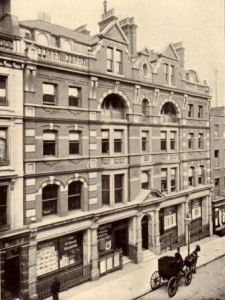He had lung problems for which there was no
cure at the time. He went to Margate to benefit from the sea air and died
there.
He was only 47 years old.
Just as C. S. Lewis’s Narnia stories wouldn’t
be the same without Pauline Baynes’s illustrations, or Lewis Carroll’s Alice
books without the pictures of John Tenniel, Sherlock Holmes wouldn’t be the
same without Sidney Paget’s contributions.
The deerstalker cap and Inverness cape
associated with Holmes were his invention.
If I could have just one of his
illustrations, it would be this one:
The story is that Sidney Paget got the
commission from the Strand Magazine by mistake: the letter should have been
addressed to his brother Walter. Perhaps this mistake was the work of some
unseen benevolent force. Sidney Paget always denied the suggestion that either
Walter or his other brother or indeed any other person was the model for Holmes.
I have my doubts about that. This is Sidney Paget:
This copy of the Strand Magazine advertising
a Sherlock Holmes story shows the street sign
high up on the south east end of Southampton Street in central London. This
street was the home of the Strand Magazine for many years, thus it was the home of the Sherlock Holmes
stories and illustrations.
The copy is dated October 1908, the month Sidney Paget would have celebrated his 48th birthday if he had lived:
By coincidence - or as a result of those
unseen influences again - not only did I live in Southsea not far from where
Conan Doyle had lived, but I have also worked in Southampton
Street - and in the building occupied by the company that published the Strand
Magazine!
Things have changed since the good old days; there is now a lot of plate glass at ground level on the old home of the Strand Magazine. However, Conan Doyle and Sidney Paget would still recognise the building because the upper stories look much the same as they did in 1896 when this picture was taken:
Things have changed since the good old days; there is now a lot of plate glass at ground level on the old home of the Strand Magazine. However, Conan Doyle and Sidney Paget would still recognise the building because the upper stories look much the same as they did in 1896 when this picture was taken:














